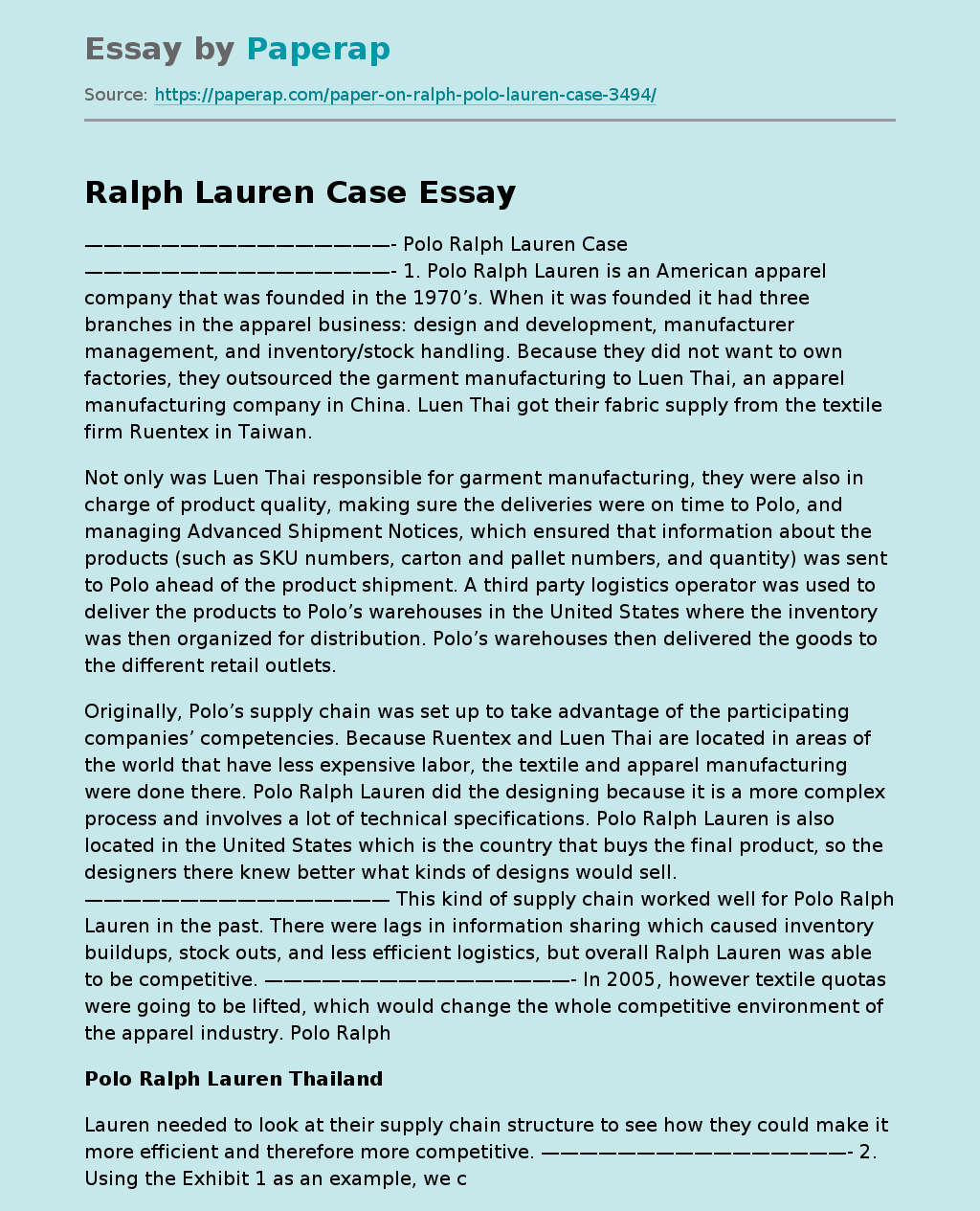Ralph Lauren Case
————————————————- Polo Ralph Lauren Case ————————————————- 1. Polo Ralph Lauren is an American apparel company that was founded in the 1970’s. When it was founded it had three branches in the apparel business: design and development, manufacturer management, and inventory/stock handling. Because they did not want to own factories, they outsourced the garment manufacturing to Luen Thai, an apparel manufacturing company in China. Luen Thai got their fabric supply from the textile firm Ruentex in Taiwan.
Not only was Luen Thai responsible for garment manufacturing, they were also in charge of product quality, making sure the deliveries were on time to Polo, and managing Advanced Shipment Notices, which ensured that information about the products (such as SKU numbers, carton and pallet numbers, and quantity) was sent to Polo ahead of the product shipment.
A third party logistics operator was used to deliver the products to Polo’s warehouses in the United States where the inventory was then organized for distribution. Polo’s warehouses then delivered the goods to the different retail outlets.
Originally, Polo’s supply chain was set up to take advantage of the participating companies’ competencies. Because Ruentex and Luen Thai are located in areas of the world that have less expensive labor, the textile and apparel manufacturing were done there. Polo Ralph Lauren did the designing because it is a more complex process and involves a lot of technical specifications. Polo Ralph Lauren is also located in the United States which is the country that buys the final product, so the designers there knew better what kinds of designs would sell.
———————————————— This kind of supply chain worked well for Polo Ralph Lauren in the past. There were lags in information sharing which caused inventory buildups, stock outs, and less efficient logistics, but overall Ralph Lauren was able to be competitive. ————————————————- In 2005, however textile quotas were going to be lifted, which would change the whole competitive environment of the apparel industry. Polo Ralph
Polo Ralph Lauren Thailand
Lauren needed to look at their supply chain structure to see how they could make it more efficient and therefore more competitive. ————————————————- 2. Using the Exhibit 1 as an example, we can see a model for the Polo’s supply chain. Each step in the supply chain operation as a whole can be understood as a unit in a big international organism. With that in mind, the bottleneck concept can be applied and we can understand that each of those steps, if improved, will not affect the whole organism unless it is a bottleneck.
If you improve the bottleneck your process will be improved, otherwise no sensible change will be observed. The big challenge managing supply chain, in this case, will be identifying which step is really the bottleneck in your chain. Polo must know well its process to define where is the real bottleneck among the material provider (Ruentex), the manufacturing activity (Luen Thai), the 3PL operator, or the warehouses (Polo). ————————————————- 3. Sharing information will be the most important tool in the process of improving Polos’ supply chain.
A better management can be achieved through a real time information system, which will help to identify more easily where the bottlenecks are. On the same side, all “work-in-process” generated for the system and the entire inventory can be managed more precisely as well. On the other side, sharing information can be dangerous when expose its business competitive advantages and strategies. In this scenario, the middle of the chain to the end looks to be the ones that will benefit the most from information sharing in face of the new strategies adopted to create efficiencies.
Having opted for being ahead on fashion trends, this differentiation associated with the need of minimum stock and time management, makes real-time information a crucial asset to Polo. So, the end of the supply chain will be the most affected if a non-controlled system starts to generate undesirable levels of inventory. ————————————————- 4. The Ruentex supplies good quality raw materials to Luen Thai, which produces the final goods according to the design elaborated for Polo.
A 3PL operator will deliver the goods to Polo’s warehouses and then the products are delivered for the different retail outlets. The main change that could be highlighted in this process is the transfer of design activity to Luen Thai. Once transit of information is a major factor of reducing efficiency in that supply chain, reducing the need of intensive communication during the design process could be a plus. But it has a cost. To design is not an area of expertise for Luen Thai, so some risk is attached to the learning curve associated to that transfer of activity/know-how from Polo to them.
Ralph Lauren Case. (2019, Dec 05). Retrieved from https://paperap.com/paper-on-ralph-polo-lauren-case-3494/

